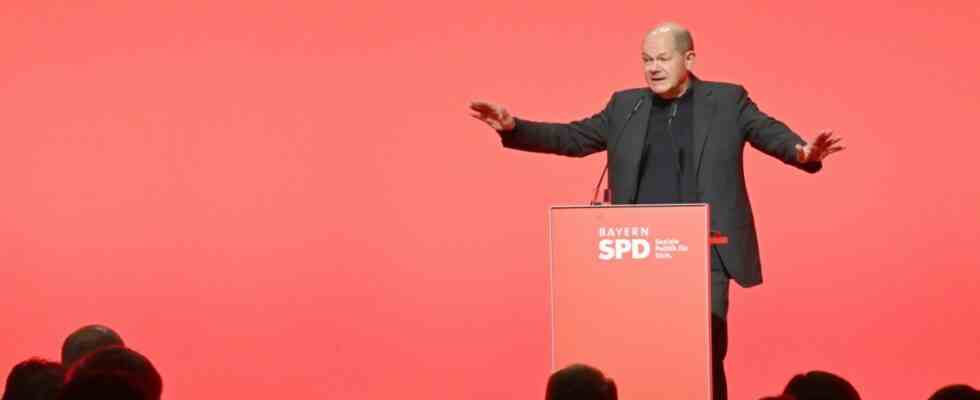Dieter Reiter, Munich’s SPD mayor, has just told what he dreams of at night. Then he goes, “when I get high-spirited”, from his town hall through the Hofgarten to the Bavarian State Chancellery, where Prime Minister Markus Söder (CSU) sits: And then there is hectic activity: because it is difficult to clear the offices, the contaminated sites to dispose of from 60 years, “all the felt” and the Strauss memorabilia that the document shredders “rattle”. And because then an SPD prime minister will move in there.
This is what Reiter reports at the party conference in the east of Munich on Saturday, which is supposed to be the first “prelude” to the Bavarian state elections next year – with the nomination of party leader Florian von Brunn as the top candidate and the visit of the Federal Chancellor. Olaf Scholz as a motivator, it was previously heard in the party, so that what the SPD did in the federal government in 2021 may also succeed in the Free State: actually making a change of government out of being laughed at because of the claim to power.
And then Scholz comes, the delegates jump up and applaud. But no campaigners came at all, it almost seems as if the chancellor had forgotten to let them know that Bavaria would be elected in 2023. A labor chancellor arrives who calmly takes stock of the government. Scholz assures citizens and companies of their full support in cushioning the high energy prices. That’s the message, he says: “Everything has been done to ensure that we can support them, and we will do it.” Electricity price brake, gas price brake, the stabilization fund with 200 billion euros decided on Friday in the Bundestag would help “so that we can get through this time together”. His government has filled the gas storage tanks, the SPD is “the industrial party” and stands for “respect” for everyone in society.
Scholz manages the trick – in the main speech at an opposition party – not to mention the state election directly once. And not once the name Markus Söder. It’s a speech that he could have given verbatim at an employer or trade union meeting somewhere in Germany. There was thunderous applause nonetheless, although when asked, some participants said that the speech “less Hanseatic” wouldn’t have been bad either. Even Brunn is named only once by Scholz. At the end, to the transition.
The state and parliamentary group leader of the Bavarian SPD then attacks Markus Söder, accusing the CSU of decades of omissions in energy, education, social and housing policy, among other things. In central areas, the prime minister is afraid to take responsibility, so the SPD must do so. For example, he wanted “Bavaria to be a global role model for climate protection and the energy transition.”
Brunn, known in the state parliament as a calf biter on duty, all in all delivered a decent speech; maybe he wants to copy a bit of Scholz. Renate Schmidt, the old Social Democrat, who got 30 percent in Bavaria in the 1990s, finally presents the desired course of the 2023 election campaign again on stage: She knows that “some people think we’re stupid” to formulate the claim to power. But it was exactly the same when Scholz was nominated as a candidate for chancellor, at that time in the nationwide poll low. And now Scholz is sitting here as Chancellor.
The most recent survey: only ten percent
Being the chancellor’s party initially gave the ailing social democracy in the Free State a boost. The comrades in Bavaria contributed 18 percent to the federal elections, after that a state survey showed even 20 percent, later at least a solid 14, 15. The state election debacle of 2018 already seemed forgotten: 9.7 percent, fifth strongest force instead of opposition leader. Then the thought arose that it could be enough for a traffic light in Bavaria to replace the CSU – “close enough to touch”, Brunn exulted at the time.
The latest BR-Bayerntrend now announced a smooth ten percent again, shortly before that, surveys also showed only single-digit approval values. There is also no structural chancellor effect after 2021, many revivals of local associations or new members. The Bavarian SPD has a “demographically determined development”, admits Brunn. Means: Older comrades die, young people don’t make up for it. This is not an ideal starting point for 2023, especially compared to the Greens, who can report growth and expansion.
The party congress is not saddened by any of this, there is clapping every half minute, no matter who is holding it. Also among the supporters of Brunn’s candidacy, and there are only supporters. Result of his election in the end: 93 percent. Ronja Endres, his co-party leader, is also one of Brunn’s advocates. To this day, many in the SPD are of the opinion that it was not Brunn and Endres who won the presidential election back then, but the dual leadership concept. That Brunn needed the trade unionist Endres in the team. Endres, as state chairman, recently failed to get a constituency in the Upper Palatinate.
Nevertheless, she gives the whiplash at the party congress, it is the most powerful speech of the day. She says that in a year Bavaria will “finally get the chance for a social policy” and “we won’t step down if things aren’t rosy.” The SPD has the right to govern and “today we choose the one who goes forward with us and for us”: Florian von Brunn. Who, by the way, at his home, as Endres describes, “feeds a squirrel with hazelnuts he bought specially” and sends her cat videos when she’s not in a good mood.
Final press conference of the party congress with Scholz and Brunn. Perhaps a personal word for the newly nominated? The top candidate has “the right concepts,” says the chancellor, nothing personal. At least: “All the best!”

